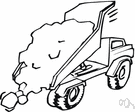un·lade (ŭn-lād′) v. un·lad·ed , un·lad·ing , un·lades
v. tr. 1. To unload (cargo) from a ship.
2. To unload (a ship).
v. intr. To discharge a cargo.
unlade (ʌnˈleɪd )
un•lade (ʌnˈleɪd) v. -lad•ed, -lad•ing. v.t. 1. to take the lading, load, or cargo from; unload.
2. to discharge (a load or cargo).
v.i. 3. to discharge a load or cargo.
[1350–1400]
unlade Past participle: unladedGerund: unladingImperative Present Preterite Present Continuous Present Perfect Past Continuous Past Perfect Future Future Perfect Future Continuous Present Perfect Continuous Future Perfect Continuous Past Perfect Continuous Conditional Past Conditional Present I unlade you unlade he/she/it unlades we unlade you unlade they unlade
Preterite I unladed you unladed he/she/it unladed we unladed you unladed they unladed
Present Continuous I am unlading you are unlading he/she/it is unlading we are unlading you are unlading they are unlading
Present Perfect I have unladed you have unladed he/she/it has unladed we have unladed you have unladed they have unladed
Past Continuous I was unlading you were unlading he/she/it was unlading we were unlading you were unlading they were unlading
Past Perfect I had unladed you had unladed he/she/it had unladed we had unladed you had unladed they had unladed
Future I will unlade you will unlade he/she/it will unlade we will unlade you will unlade they will unlade
Future Perfect I will have unladed you will have unladed he/she/it will have unladed we will have unladed you will have unladed they will have unladed
Future Continuous I will be unlading you will be unlading he/she/it will be unlading we will be unlading you will be unlading they will be unlading
Present Perfect Continuous I have been unlading you have been unlading he/she/it has been unlading we have been unlading you have been unlading they have been unlading
Future Perfect Continuous I will have been unlading you will have been unlading he/she/it will have been unlading we will have been unlading you will have been unlading they will have been unlading
Past Perfect Continuous I had been unlading you had been unlading he/she/it had been unlading we had been unlading you had been unlading they had been unlading
Conditional I would unlade you would unlade he/she/it would unlade we would unlade you would unlade they would unlade
Past Conditional I would have unladed you would have unladed he/she/it would have unladed we would have unladed you would have unladed they would have unladed
Thesaurus Antonyms Related Words Synonyms Legend:
Verb 1. unlade - take the load off (a container or vehicle); "unload the truck"; "offload the van"empty - remove; "Empty the water"
unlade verb To remove the cargo or load from:
 unlade - take the load off (a container or vehicle); "unload the truck"; "offload the van"
unlade - take the load off (a container or vehicle); "unload the truck"; "offload the van"